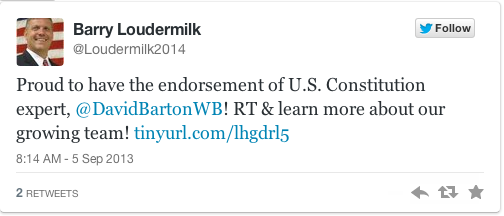Reading Senator Ted Cruz’s endorsement of David Barton in Monday’s edition of Politico brought to mind Barton’s narrow reading of the First Amendment. First, let’s note again Cruz remarks:
David’s historical research has helped millions rediscover the founding principles of our nation and the incredible sacrifices that men and women of faith made to bequeath to us the freest and most prosperous nation in the world.
One founding principle Barton has written about is the freedom of religion and First Amendment. What does Barton believe about the First Amendment?
In a 2010 Amicus brief filed in McCollum v. CA Dept. of Corrections, Barton argued that the word religion in the First Amendment meant monotheism. The case involved Wiccan minister Patrick McCollum who was excluded from a job in the CA prison system since he was not one of the five faiths allowed to be a prison chaplain in CA: Protestant, Catholic, Muslim, Jewish, Native American.
In his brief, Barton wrote that the framers defined religion to exclude any religion which is not monotheistic. Thus, the First Amendment should not apply to religions which are not monotheistic.
Whether “religion” meant monotheism or some subset of it, such as Christianity, then whatever the Free Exercise and Establishment Clauses address, they do not address paganism or witchcraft. In reality, research shows that “religion” was sometimes used as a synonym for Christianity, but that it was also used for monotheism. But that still excludes paganism and witchcraft. (p. 9)
The true historic meaning of “religion” excludes paganism and witchcraft…(p. 7)
…your Amicus will briefly survey the diversity of opinions held by the Framers to demonstrate that paganism and witchcraft were never intended to receive the protections of the Religion Clauses. (p. 9)
The Founders did not intend to extend the protection of the Religion Clauses to paganism and witchcraft as eight of the then-sitting nine Justices of the Supreme Court have recently acknowledged. (pp. 17-18)
I wonder if Sen. Cruz also believes this way. He also said in Politico that he isn’t “in a position to opine on academic disputes between historians,” but he may soon run for a position — the GOP presidential nomination — where his views on such disputes will garner intense scrutiny. Since Cruz thinks so highly of Barton’s views on the founding principles, it is a fair question to ask what he believes about the First Amendment. Are all religions covered? Just some? Which ones?
Barton’s position raises some important questions about application of the First Amendment in the present day. If we are to understand the definition of religion now in terms of the religions extant at the time of the framers, then what is the Constitutional status of religions developed since then? Take, for example, the Latter Day Saint church established in 1820s.
Furthermore, if the protection of the religion clauses only extend to monotheistic religions then what about religions which hold that there is more than one god? Take, for example, the Latter Day Saints.
While LDS apologists would deny they are polytheistic, at the same time, they do not believe monotheism describes them or most Christians well. They don’t hold to the trinity as most Christians do and they do believe that men may someday become gods, and even if not worshiped in this dispensation, may be elsewhere. Surely, this process has been taking place throughout the universe; thus there would have to be multiple gods.
By Barton’s logic, the LDS church would be a questionable Constitutional case. However, as I have established before several times, the framers envisioned First Amendment protections for freedom of conscience, whether no god, one god or several are involved.
Back to Ted Cruz; what does he believe? If he believes Barton’s history lessons have helped millions rediscover the founding principles, then presumably he is one of those millions. I certainly want to know if he believes all religions and people of all faiths have First Amendment protections.

